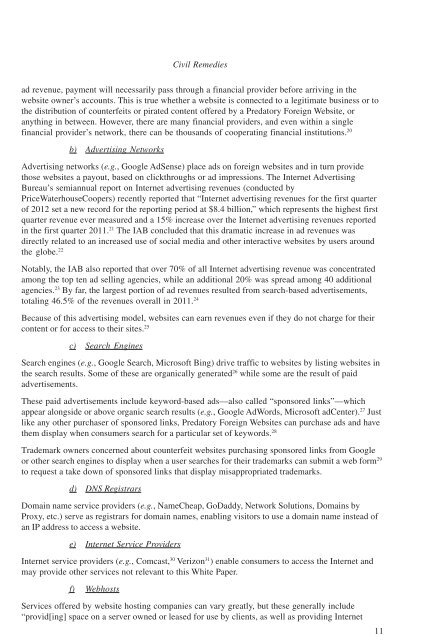1oz61wa
1oz61wa
1oz61wa
Create successful ePaper yourself
Turn your PDF publications into a flip-book with our unique Google optimized e-Paper software.
Civil Remedies<br />
ad revenue, payment will necessarily pass through a financial provider before arriving in the<br />
website owner’s accounts. This is true whether a website is connected to a legitimate business or to<br />
the distribution of counterfeits or pirated content offered by a Predatory Foreign Website, or<br />
anything in between. However, there are many financial providers, and even within a single<br />
financial provider’s network, there can be thousands of cooperating financial institutions. 20<br />
b) Advertising Networks<br />
Advertising networks (e.g., Google AdSense) place ads on foreign websites and in turn provide<br />
those websites a payout, based on clickthroughs or ad impressions. The Internet Advertising<br />
Bureau’s semiannual report on Internet advertising revenues (conducted by<br />
PriceWaterhouseCoopers) recently reported that “Internet advertising revenues for the first quarter<br />
of 2012 set a new record for the reporting period at $8.4 billion,” which represents the highest first<br />
quarter revenue ever measured and a 15% increase over the Internet advertising revenues reported<br />
in the first quarter 2011. 21 The IAB concluded that this dramatic increase in ad revenues was<br />
directly related to an increased use of social media and other interactive websites by users around<br />
the globe. 22<br />
Notably, the IAB also reported that over 70% of all Internet advertising revenue was concentrated<br />
among the top ten ad selling agencies, while an additional 20% was spread among 40 additional<br />
agencies. 23 By far, the largest portion of ad revenues resulted from search-based advertisements,<br />
totaling 46.5% of the revenues overall in 2011. 24<br />
Because of this advertising model, websites can earn revenues even if they do not charge for their<br />
content or for access to their sites. 25<br />
c) Search Engines<br />
Search engines (e.g., Google Search, Microsoft Bing) drive traffic to websites by listing websites in<br />
the search results. Some of these are organically generated 26 while some are the result of paid<br />
advertisements.<br />
These paid advertisements include keyword-based ads—also called “sponsored links”—which<br />
appear alongside or above organic search results (e.g., Google AdWords, Microsoft adCenter). 27 Just<br />
like any other purchaser of sponsored links, Predatory Foreign Websites can purchase ads and have<br />
them display when consumers search for a particular set of keywords. 28<br />
Trademark owners concerned about counterfeit websites purchasing sponsored links from Google<br />
or other search engines to display when a user searches for their trademarks can submit a web form 29<br />
to request a take down of sponsored links that display misappropriated trademarks.<br />
d) DNS Registrars<br />
Domain name service providers (e.g., NameCheap, GoDaddy, Network Solutions, Domains by<br />
Proxy, etc.) serve as registrars for domain names, enabling visitors to use a domain name instead of<br />
an IP address to access a website.<br />
e) Internet Service Providers<br />
Internet service providers (e.g., Comcast, 30 Verizon 31 ) enable consumers to access the Internet and<br />
may provide other services not relevant to this White Paper.<br />
f) Webhosts<br />
Services offered by website hosting companies can vary greatly, but these generally include<br />
“provid[ing] space on a server owned or leased for use by clients, as well as providing Internet<br />
11


